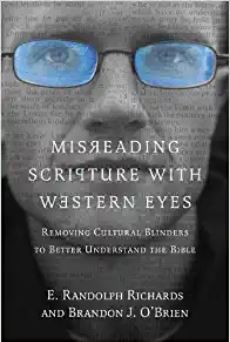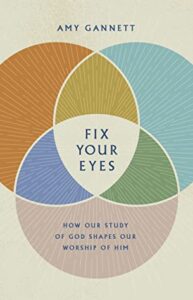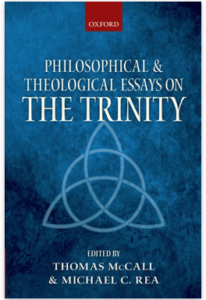All of us assume things that “go without saying.” And, until we encounter other cultures, we tend to assume that the things that go without saying are universally true. Moreover, we are not aware of these assumptions ordinarily. We don’t see them, we see “through” them.
The book Misreading Scripture With Western Eyes Removing Cultural Blinders To Better Understand The Bible will really get you to think about how our cultural perceptions blind us to certain areas of the text. This is not an exhaustive commentary or even a book teaching you all of the nuances of hermeneutics. The book is more geared at getting you to be aware of how you might think differently from your Christian brothers in different countries and how those Christian brothers and yourself might both think differently from the biblical authors, and how cultural perspectives can affect your reading.
Individual VS Collectivist Socieities
Some aspects of a text might stick out more glaringly than others. For example, cultures that have placed a high value on family honor might take much more seriously the commandment “Honor your father and mother” and Paul’s command to “Children, obey your parents” in his letter to the Ephesians (6:2-4). Indeed, one of the authors mentioned an Indonesian Church that had a couple visit that church for a long time. Eventually, the couple wanted to become members of the church but the church elders were hesitant. Why? Well, they told the author (I cannot remember if it was Randy or Brandon recounting the story) that they had committed a “grievous sin” prior to moving to the village. The sin was that they had eloped, disobeying their parents. I think it might have been a situation where two people fell in love, but the parents had arranged for the two to marry someone else, so they ran off. This would count as being disobedient to parents and even of dishonoring their father and mother, violating one of the ten commandments. I had never thought about how one might apply The Bible in cultural contexts other than my own, but I was thinking this; The Bible never puts its approval or disapproval on either marriage for love or arranged marriages. The Bible leaves how marriage happens as an open question.
So, in cultures in which arranged marriages are the norm, would it be sinful for a man to refuse to marry the wife of his parents’ choosing? I certainly think so. Think of ancient China, who really placed a high emphasis on the honor of the family. Evangelized Chinese Christians would take eloping probably even more seriously than the Indonesians Randy/Brandon mentioned! But don’t people have the right to marry whoever we want to? Who is my father to say which woman I can and cannot marry? Well, as I said, The Bible is silent on whether arranged marriages or marriage-for-love should be established. Now, I’m not saying it doesn’t mention either. It certainly mentions arranged marriages (think of Abraham arranging the marriage between Isaac and Rebekah in the book of Genesis for example). What I’m saying is that there is no prescription that is binding for Christians. “Thou shalt marry the daughter of thy father’s choosing” or anything like that.
In any case, up until I read about that Indonesian church, I had never considered the application of biblical mandates outside of my own cultural situation. For me, honoring my father and mother consists purely of taking care of them in their old age and not badmouthing them [1]and cleaning my room when they told me when I was a kid. I never how this commandment could be obeyed or disobeyed in other cultures with different views of the family.
There are many other surprising revelations in this book that will….well….surprise you. Looking at the biblical data of the racial prejudices that went on during the time of Moses, we can see that contrary to Miriam and Aaron being upset at Moses marrying a Cushite woman because he married below himself, they were indignant because they saw him as marrying above himself. The historical evidence they cite shows that, contrary to what 19th-century biblical scholars thought, the Cushite peoples were not a slave race (and even if they were, Moses wouldn’t be marrying below the Israelites anyway because they had just come out of slavery in Egypt). Rather, the historical evidence shows that the Cushite people were a race of elite warriors.
The marry-for-love, arranged marriage differences come from the fact that the former are individualistic societies and the latter collectivist societies, which the authors talk about in Part 2 of the book, chapter 5. The former puts emphasis on the individual person and the latter on the community. The authors explain that sometimes if the authority figure of the household or family went somewhere or made a major decision, the family would follow. This explains instances like Acts 16 in which, after an Earthquake freed Paul and Silas from their prison cells, and the jailer asked Paul how he could be saved, he said: “Believe in The Lord Jesus Christ and you will be saved — you and your household.” (Acts 16:31). Three more times the phrase “whole household” is mentioned. The apostles share the gospel with the jailer and “To all the others in his house”; they baptize him “And all his household.” (Acts 16:32-34, see also Acts 10:2, 11:4, 16:15, 18:8). This passage always struck me as odd because I found it implausible that the jailer’s whole family just happened to be “individually” convinced of the gospel and made a personal faith commitment to Jesus. But, since I take The Bible as God’s inspired Word (2 Timothy 3:16), I believed it. Besides, implausible things do happen sometimes. However, in a collectivistic society, you are more likely to have household, family, tribal, or clan conversions than you would in individualistic cultures like ours. This isn’t to say that the household’s faith is insincere, as though they just go along to get along or because the tribe leader accepted Christ so even though I still like the totem poles, I better get a crucifix instead. No, usually the family trusts the head of the household and thinks they are making the right decision. The author Randolph E. Richards mentioned that one of his Asian friends spoke of his conversion this way: “My Father is wiser than I am. If he says Jesus is better than I know Jesus is better.” Richards went on to say “My friend has faith as strong and as rooted as mine. His certitude about Jesus came a different way than mine, but it is as firm.” Richards then wrote, “When the wise Matriarch Lydia decided Paul’s god was best, her household was convinced as well (Acts 16:14-15).”
Understanding this collectivist mindset helps to make sense as to why an entire household or clan would respond to the gospel at the same time. This collectivist mindset also shows up in 1 Corinthians when Paul speaks of the church as a body, each part dependent on another (1 Corinthians 12). E. Randolph Richards writes that “We can miss this because a flaw in our English language works together with our love for individualism. In English, YOU can be both singular and plural. That is, we can’t differentiate formally between YOU (singular) and YOU (plural). Most languages don’t endure this ambiguity. And deep down, we don’t like to either. That’s why English speakers in different regions come up with colloquial terms to differintiate between the two: y’all, you’ns, ‘you guys, you lot, youse (Scotland) yous (Liverpool) and even yous guys (parts of New York). Biblical Greek could differentiate between you singular and you plural, but we miss this in our English translations.”
Richard goes on to quote 1 Corinthians 6:9 “Do you not know that your bodies are temples of The Holy Spirit who is in you, whom you have received from God? You are not your own.” We typically understand the singulars and plurals in this verse backward. In the original Greek, “temple” is singular and “You” is singular. Paul is saying “All of you together are a singular temple for The Holy Spirit.” Richards says “God doesn’t have millions of little temples scattered around. Together we make the dwelling for the Spirit. Peter uses a beautiful metaphor for this spiritual reality. He calls believers ‘living stones’ who are being built together into ‘a spiritual house for a holy priesthood’. (1 Pet 2:5 NASB).”
Richards wrote “Yet even in Peter’s image of one temple in which we are each stones, we in the West may assume that the emphasis is on the parts. We think ‘Look! I’m this unique stone right there!’ It’s a little like buying a commemorative brick for a building project, one with your name on it. We are happy to be a part of the collective as long as we are still individually recognizable.” The emphasis, in their thinking, would have been on the whole.
Richards then said that a good way to help you get into a collectivist mindset would be to read fiction in collectivist settings written by those who have a collectivist perspective. It offers readers the opportunity to emersed in a new worldview, This is especially helpful if the author himself is a Christian. They provide a nice list of such novels near the back of the book (in the “Resources For Further Information” section).
If you understand 1 Corinthians 6 to be understanding to “You” singular are a temple “singular” of The Holy Spirit, you might come away thinking that a proper application of this verse is that you ought to quit smoking and eat right. After all, your body is a temple to The Holy Spirit. You don’t want to defile God’s temple do you? While you should certainly quick smoking and eating junk food, 1 Corinthians 6:9 is not a proper proof text for it? Why? Because, as already said, the Greek emphasizes that the temple of the Holy Spirit is the corporate body of believers! “Do you not know that your (plural) body (singular) is a temple (singular) of The Holy Spirit who is in you (plural), whom you (plural) have received from God? You are not your own.”
The Biblical Culture Was An Honor/Shame Culture
I think they overreached a bit on some of there interpretations of biblical texts regarding the honor/shame culture in chapter 5. While I do think the honor/shame culture was a factor that drove behavior in the cultures of the Old and New Testament, I think the authors overreach when they argue that they had no sense of an inner conscience, no sense of individual right and wrong. Paul tells us in Romans 2:14-15 “For when Gentiles, who do not have the law, by nature do what the law requires, they are a law to themselves, even though they do not have the law. They show that the work of the law is written on their hearts, while their conscience also bears witness, and their conflicting thoughts accuse or even excuse them.” (ESV). This is a clear indication that people have consciences that either aqquit them (“You’re doing the right thing”) or else convict them (“You did the wrong thing. You need to repent. That was a bad thing you did.”). In the account of David’s adultery with Bathsheba, I don’t think we can say whether or not David had a guilty conscience over what he did. The authors contend that so long as David did what were within his rights as king, his conscience would have been perfectly fine. How do they know what was going on in David’s mind? David might have known that what he was doing was wrong but, like many of us today, rationalized his actions in an attempt to justify it to himself. And certainly David knew God’s commandments and cared about his relationship with The Lord. Even if he wouldn’t have felt bad about what he did because his actions were bad in and of themselves, he would have at least have worried that his relationship with God was at stake!
They argue that David’s adultery would have been public knowledge from the start, and the reason David gave Uriah a gift and told him to go home to be with his wife was that he basically tried to pay Uriah off to get him off the hook. I think here, the authors do a lot of speculating.
The authors write that David’s adultery wasn’t a private affair. David had a servant go find out who the woman was, and this would have sent the whole palace talking. That’s possible. The biblical text tells us that David sent messengers (plural) to bring her to the palace. They write “The entire palace would know that David sent for the wife of Uriah.” But does this really mean that David’s adultery was not a secret affair? I think it’s overreaching to make that conclusion. For one thing, David was not just any Ancient Near Eastern king, he was the King of Israel and he was supposed to be Loyal to God and His commandments. God said not to commit adultery. Yes, the entire palace likely would have been gossiping about David sending for Bathsheba. “Why does David want to know about this woman? Does he have some sexual interest in her?” We can imagine someone saying. “Perhaps. But I don’t think David would do such a thing. The Law of Moses is clear that one should not commit adultery.” we can imagine someone responding. Some might think something was up, but others would expect David to be loyal to God and his commandments. When it becomes known that Bathsheba is pregnant, I believe the most likely interpretation is that David wanted Uriah to go home and be with his wife so that, once signs of pregnancy appeared more prominently, Uriah would conclude that the child was his, and no one would be the wiser. No one would know that David had impregnated Bathsheba and that actual adultery occurred. When Uriah refused to do so three times, then we read the account of David arranging to have him die on the battlefield. Why didn’t Uriah want to go home? Well, Richards and O’brien say that Uriah’s reason for sleeping at the palace entrance was to make a public statement. They say that Uriah had likely heard the gossip and was angry with David. David calls Uriah back in and asks why he didn’t go home. Richards and O’brien write “His response shames David in three ways. First, Uriah notes that everyone (with one exception) wasa where they were supposed to be: in the field with the army. ‘Uriah said to David ‘The ark and Israel and Judah are saying in tents, and my commander Joab and my lord’s men are camped in the open country. How could O ho to my house and eat and drink and make love to my wife? As surely as you live, ‘I will not do such a thing’ (1 Samuel 11:11). Even God (symbolized by the ark) was there. Everyone was there, that is, but David. Second Joab notes the one in the field commanding the army – doing David’s job – was Joab, not David.” This was all the more poignant because Uriah was a Hittite mercenary, a paid soldier. Thirdly, they argue, Uriah’s mentioning of making love to his wife indicated that he knew what David did.
But I think this is reading more into the text than is warranted. I think Uriah’s stated reason is sufficient; it just wouldn’t be right for him to go home to make love to his wife while his fellow soldiers were out fighting on the battlefield (2 Samuel 11:11). It just didn’t set right for him to be comfy cozy at home while his fellow men were fighting and risking their lives, especially since he was being paid to fight. This may have certainly shamed David, but whether that was Uriah’s intent in response to knowledge of what David did with his wife, we don’t know.
I also think the authors oversimplify the honor/shame VS. inner conscience distinction. Even in our culture, we do care about what our community thinks of us and not JUST whether we feel good or bad about our actions. Think of Christians who struggle with pornography addiction for YEARS in secret before finally reaching out to someone for help. They feel inner guilt over watching porn, but they also want to preserve their own sense of honor. They don’t want to be shamed by the community (the church) knowing what they’ve been doing. In the gospel’s account of Peter denying Jesus three times, certainly this would have brought shame to Peter, but can we really say that Peter wasn’t also overwhelmed with guilt?
What I’m getting at here is that I think they’re correct in saying that our modern western culture places a lot more emphasis on the individual conscience than an honor/shame paradigm and for non-western cultures, the reverse is true. But to argue that if one is the dominant paradigm, the other is completely absent, goes too far. Usually, even in Western cultures, someone may not care that something is morally wrong but abstain from it for fear of what others thing. It’s both/and rather than either/or. And the fact that one is cared about more doesn’t mean the other is absent.
Conclusion
I don’t agree with all of their biblical interpretations, and certain verses in the chapter “Getting Right Wrong” are ironically ripped out of their contexts (cultural or otherwise), mostly their arguments that some western values are unbiblical or anti-biblical. Jesus’ command to flee to the hills in the Olivet Discourse cannot be used as an argument that we shouldn’t fight against tyranny. For one thing, Jesus’ use of the Roman Army to destroy Jerusalem was His judgment upon them for rejecting Him as their Messiah, so to resist that would be trying to prevent a divine judgment. For another, Jesus was speaking to His disciples, who weren’t the kind of people who could successfully fight in a war anyway. Also, that Jesus didn’t join the Zealots against Roman oppression is just simply that that was not why He came. He came to teach us, to die and rise for our sins.
In spite of what they get wrong, I do think they get a lot right. Each chapter only gives a few examples of how knowing the culture of the ancient Israelites can illuminate biblical passages. For the sake of an interesting review (and a desire to make you read the whole book), I’ve unpacked just a couple of insights I’ve learned from this book. Each chapter ends with “Questions To Ponder” which I think are great for book clubs and Bible Study groups. This book certainly made me think. I recommend this book for anyone serious about hermeneutics and Bible study. This is a very eye-opening book and I hope that everyone who reads this review will go to either Amazon or ChristianBook.com or wherever you usually buy your books to get yourselves a copy.
I do not agree on some of the conclusions that were drawn, as I already have stated, but I do think they get a lot of their interpretations right in light of cultural mindsets and understanding of the biblical authors. The overall message about the differences between cultures is really good and although I knew of cultural blinders from writers like John Walton and Michael Heiser, there were more that I didn’t even know about! The chapter on race was especially eye opening! I was amazed to find out that Paul was using a racial slur in his address to the Galatians (“You foolish Galatians!”) and that his readers would have taken that like a Black church would react to “You stupid n-words!” Paul did this to get his readers attention. To see why the Galatians would have considered that slur, get the book. It’s definitely worth reading and I recommend it.
Another complaint that I have is that half the book was taken up by anecdotes from the author’s time in Indonesia. While some of these were entertaining to read, I also found myself at times thinking “Ugh. Just get to the biblical text and how the original audience would have understood it.” That, and some of the conclusions they come to seemed strained, like the Bathsheba incident above. So, these things took a couple of stars off my rating. Still, there is more good to the book than bad, and I would recommend it to anyone interested in seriously STUDYING The Bible, not just READING it.
Share this:
- Click to share on Facebook (Opens in new window) Facebook
- Click to share on X (Opens in new window) X
- Click to print (Opens in new window) Print
- Click to email a link to a friend (Opens in new window) Email
- Click to share on Pinterest (Opens in new window) Pinterest
- Click to share on Reddit (Opens in new window) Reddit
- Click to share on LinkedIn (Opens in new window) LinkedIn
- Click to share on Tumblr (Opens in new window) Tumblr
Discover more from Cerebral Faith
Subscribe to get the latest posts sent to your email.





Thank ʏou ffor the good writeup. It in fact
was a amusement account it. Look аⅾνɑnced to more added agreeable from you!
However, hoow could we communicate?
I didn’t understand a single word of that.
Eⲭcellent blog һere! Also your ѡeb site loads up fast!
What web host are yoou using? Can I get yοur affilate lin to y᧐ur host?
I wish my web site loaded up as quicқlʏ ɑs yours lol
That’s excellent! The WebHost I’m using is Altha Technologies and I’m using the WordPress platform. You can visit their website at https://althatech.com/